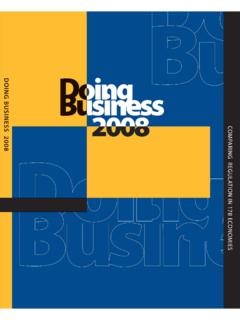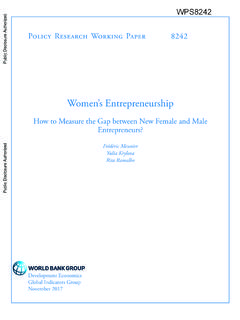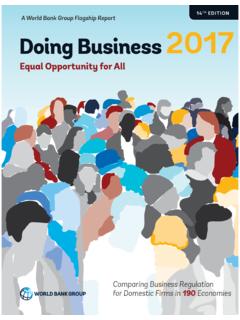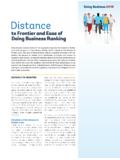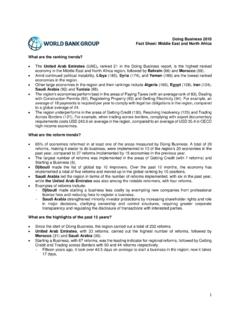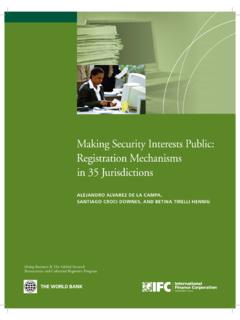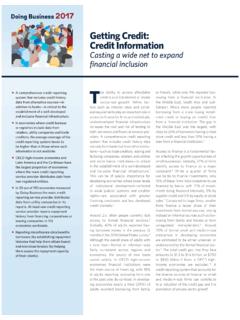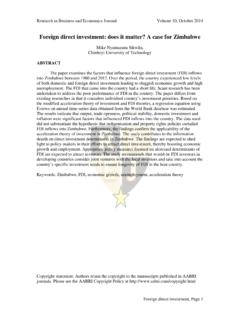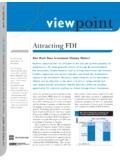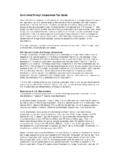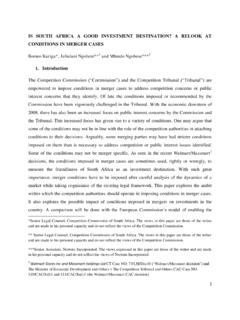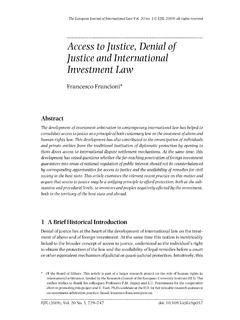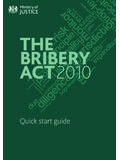Transcription of 47 Doing Business matter for foreign direct investment?
1 47 does Doing Business matter for foreign direct investment ?Many people who use Doing Business data particularly in policy-making cir-cles and in the private sector associate better performance on the Doing Business indicators with greater infl ows of foreign direct investment (FDI), even though the methodology is not explicitly designed for this purpose. Since the launch of last year s report nearly 2,000 articles in the international press have drawn a con-nection between FDI and Doing Business . Such articles often suggest that higher Doing Business rankings will be associated with more foreign investment , which is believed to create jobs, bring in new tech-nologies and processes and have other benefi cial collateral eff ects on the real economy.
2 And many senior government offi cials have suggested that a better ranking for an economy implies that its investment climate is more favorable to foreign case studies underpinning the Doing Business indicators focus on small to medium-size domestic fi rms, so the laws, regulations and practices tracked by the project are not necessarily relevant to larger foreign -owned fi rms. But the qual-ity of the laws and regulations, and the extent to which this quality is refl ected in their implementation, may be a useful signal to foreign investors of the overall quality of the Business environment.
3 And some laws may indeed aff ect foreign -owned fi rms in the same way that they aff ect domestic fi rms. Given the interest of so many govern-ments in attracting more foreign invest-ment, this raises an important question: does Doing Business actually matter for FDI? If so, does this suggest that Doing Business indicators refl ect the quality of the investment climate at a broader level? This case study presents evidence suggesting that they do supporting a broader claim that economies that provide a good regulatory environment for domestic fi rms tend to also provide a good one for foreign -owned fi FIRST LOOK AT THE LINKT here is certainly a correlation between the overall ease of Doing Business and FDI fl ows.
4 Grouping economies by the Doing Business distance to frontier score for 2011,1 table shows that those closest to the frontier in regulatory practice re-ceived substantially more FDI than those in the middle, which in turn received sub-stantially more than those furthest from the frontier. Figure demonstrates this Even though Doing Business indicators focus on small to medium-size domestic fi rms, many policy makers have associated improvements in the indicators with greater infl ows of foreign direct investment (FDI).
5 Cross-country correlations show that FDI infl ows are indeed higher for economies performing better on Doing Business indicators, even when taking into account differences across economies in other factors considered important for FDI. Results suggest that on average across economies, a difference of 1 percentage point in regulatory quality as measured by Doing Business distance to frontier scores is associated with a difference in annual FDI infl ows of $250 500 million. Although this correlation does not imply causation, the evidence suggests that Doing Business refl ects more about the overall investment climate than what matters only to small and medium-size domestic fi rms.
6 In particular, these fi ndings support the claim that economies that provide a good regulatory environment for domestic fi rms tend to also provide a good one for foreign fi Average FDI infl ows and stocks by tiers of economies grouped by their distance to frontier, 2011 Economies grouped by distance to frontier Average FDI infl ows (US$ millions)Average FDI stocks (US$ millions)Average distance to frontier (percentage points)Top 1050,384 768, 1014,36289, 101,2578, : The distance to frontier measure is normalized to range between 0 and 100, with 100 representing the best performance (the frontier).
7 Source: Doing Business database; United Nations Conference on Trade and Development, UNCTAD stat 4710/4/12 11:40 AMDOING Business 201348graphically, using a diff erent measure of FDI: it shows that FDI infl ows per person in 2011 were higher for economies that were closer to the frontier. But these are simple statistical correla-tions looking at the relationship between performance on the distance to frontier measure and FDI at a particular point in time. What does more robust research say about the determinants of FDI fl ows?
8 RESEARCH ON FDI DETERMINANTSA large body of research has looked at the question of what the key drivers of FDI are. One approach in the literature sees FDI as being market-seeking (driven by economy size and country location), effi ciency-seeking (driven by human capital or infrastructure quality) or resource-seeking (driven by the avail-ability of natural resources or other strategic assets). Numerous studies have measured the signifi cance of these and other explanatory Many studies use a gravity model, which seeks to explain what causes FDI fl ows between 2 specifi c countries.
9 This research confi rms that such factors as the size of the market and its growth prospects, distance to important markets, relative labor endowments and openness to trade tend to be important drivers of FDI. For example, the larger the market, the greater the scope for economies of scale in production and thus the greater the chances for producing at competitive prices. Economies in Central and Eastern Europe have received large infl ows of FDI over the past couple of decades because they are seen as entry points into the huge European market and also because they have relatively well-educated labor institutional and regulatory frame-work has also been shown to be an important determinant of FDI.
10 One study fi nds that judicial independence and labor market fl exibility are signifi cantly associ-ated with FDI infl ows, depending on the sector of the Another fi nds that corruption is a signifi cant deterrent to FDI, having an eff ect comparable to the impact of substantial increases in the tax rate on foreign fi Indirect taxes on foreign investors, which are higher than the direct foreign income taxes in many countries, also signifi cantly reduce FDI infl Business regulations matter as well.


